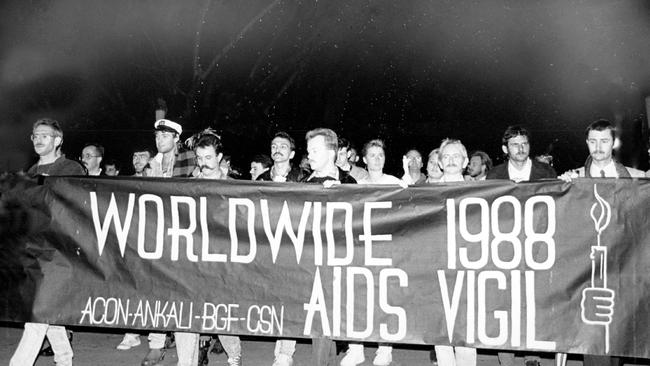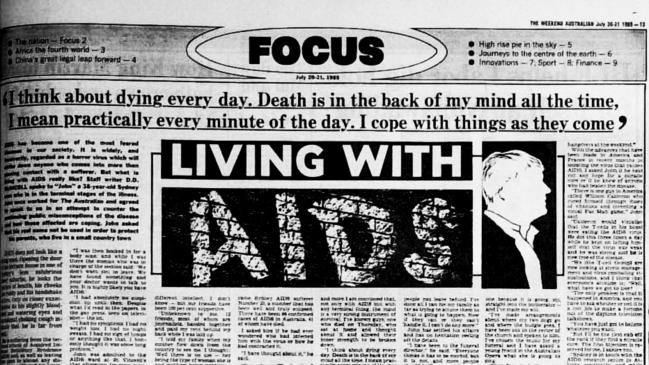‘I think about dying every day’: Living with AIDS in the 1980s
‘John’, who once worked for The Australian, was Sydney AIDS sufferer No. 20. He spoke to our reporter to explain his disease and society’s reaction to it.

For this masthead’s 60th anniversary we are revisiting our coverage of major events. Explore more from this series here.
By the mid-80s, HIV-AIDS had become widely feared – and misunderstood. In a bid to demystify the disease and highlight the plight of its victims, staff writer D.D. McNicoll spoke to a 38-year-old Sydney man in the terminal stages of the illness. “John”, who once worked for The Australian, asked that his real name not be used in order to protect his parents, who lived in a small country town.
LIVING WITH AIDS
- By D.D McNicoll. First published July 20, 1985

John does not look like a dying man. Opening the door of his terrace house in one of Sydney’s salubrious inner suburbs, he looks the picture of health, his cheeks are ruddy and his handshake firm. Only on closer examination do his slightly bloodshot and watering eyes and occasional choking cough indicate that he is far from well.
He is suffering from the terminal effects of Acquired Immune Deficiency Syndrome and as well as leaving him open to almost any disease, it has affected his lungs. Doctors at the AIDS clinic at Sydney’s St Vincent’s Hospital have given him no timetable of life but judging by the death rate of his fellow AIDS sufferers he has probably less than 12 months to live.
Sitting over coffee at the table in his sunny dining room, John’s mood ranged from elation to introspection as we discussed his life since he became an AIDS victim, and his limited future.
“The longer l have AIDS and the longer I’m on this earth, the more I start to think that I’m not that much different from someone with cancer or MS (multiple sclerosis) or leukaemia or what-have-you,” he said. “The big difference between having AIDS and those other diseases is that if you have MS you know that you are going to die of MS: if you have lung cancer, you know you are going to die of lung cancer. With AIDS you don’t know what will kill you.
“I don’t think that any of the fellows in our group (Sydney’s AIDS victims) are frightened of the actual dying process of death itself, but what makes you anxious is worrying about what you are going to get next – you are liable to catch anything.”
John, who has spent his life working in the advertising and promotion industries, took a long time to discover he was suffering from AIDS because he showed none of the usual symptoms. “In June last year I got shortness of breath and I thought ‘Oh well, too many cigarettes’ – I was smoking about 60 a day – ‘I’ll cut those out’, so the Monday after the opening ceremony of the Olympics I gave them up, simple as that.
“The shortness of breath went away but it came back around November … My doctor finally checked me into St Vincent’s medical centre for a full respiratory check.
“I was then booked in for a body scan, and while I was there the woman who was in charge of the section said: ‘We don’t want you to leave. We have found something and your doctor wants to talk to you. It is highly likely you have AIDS.’
“I had absolutely no suspicion up until then. Despite what I’d read in the papers, in the gay press, seen on television – the lot. I had no symptoms. I had no weight loss. I had no night sweats, I had no sign of lumps or anything like that. I honestly thought it was some lung problem.”
John had to spend a couple of weeks in hospital before he was discharged, and he was amazed at the reaction of his friends.
“As far as feeling that people regarded me as a leper or something like that, it is a reaction I haven’t come across,” he said.
“I told my family when my mother flew down from the country to see me. I thought: ‘Well there is no use – her being the type of woman she is and mothers being mothers – in hiding the truth from her.’
“She knew I was gay. I’m almost 38 years old and I’ve been an active homosexual since before I left school. Her attitude was, she told me when we had dinner one night when I got out of hospital: ‘Well, of course, you chose your lifestyle, and this is what you have got out of it.’
“She DID mean it that way, and a lot of parents are like that! But I still don’t think she has really come to grips with the fact that I’m dying.”
John told his employer he had AIDS and arranged to work as long as he felt necessary. “I got to the stage where I felt, ‘Why should I keep working for The Man’,” he said, “If one has been given a time limit, why not do what you want to do? So I worked for as long as I had to to pay off my debts.”
John, like most terminal AIDS sufferers, is on an invalid pension. When he was listed with the Health Department, he became Sydney AIDS sufferer Number 20, a number that has been well and truly eclipsed.
“I think about dying every day. Death is in the back of my mind all the time, I mean practically every minute of the day – but the lid is on it. And I cope with things each day as they come.”
With the advances that have been made in America and France in recent months in isolating the virus that causes AIDS, I asked John if he held out any hope for a miracle cure or if he knew of anyone who had beaten the disease.
“Sydney is in touch with the AIDS research centre in Atlanta constantly, and while one is hopeful they will find a cure, I’m also open to the fact that it will be too late for me.”

To join the conversation, please log in. Don't have an account? Register
Join the conversation, you are commenting as Logout